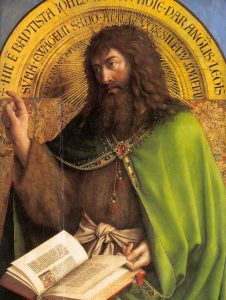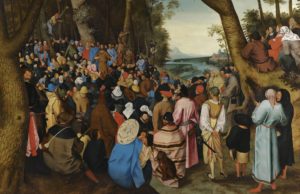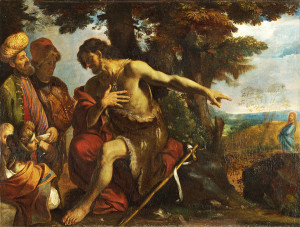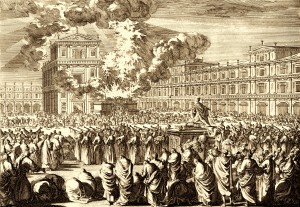Thoughts on Sunday’s Lessons for Dec. 8, 2024
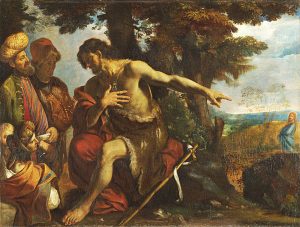
Saint John the Baptist preaching in the Wilderness (c.1640), oil painting on canvas by Pier Francesco Mola (1612-1666). National Gallery, London. (Click image to enlarge.)
First Reading: Baruch 5:1-9
A messenger is coming to make the way ready for the Messiah! Two alternative passages from minor prophets both draw this hope to our attention in Sunday’s first reading. The first option is found in the book of Baruch, whose name in Hebrew means “Blessed.” His is one of the apocryphal books placed at the end of the Hebrew Bible. Echoing a more familiar passage from Isaiah, Baruch tells Israel in exile that it no longer needs to mourn, for God will lower the mountains and fill up the valleys to make level ground upon which the people may walk safely home. In Sunday’s Gospel, we hear Luke repeat Isaiah’s verses in the voice of John the Baptist.
Or:
First Reading: Malachi 3:1-4
In this alternative first reading, the minor prophet Malachi – whose name actually means “my messenger” in Hebrew – brings a dire warning to the people living in Jerusalem generations after the return from exile: God’s messenger must cleanse the people with fire, he prophesies, an action necessary to make them pure and pleasing to God. “Who can endure the day of his coming?” the prophet sings, in words that Handel would make unforgettable 2,000 years later in The Messiah. “He is like a refiner’s fire!”
Psalm: Canticle 16 (Luke 1: 68-79)
We sing Canticle 16 from the Book of Common Prayer – a direct quote from Luke’s Gospel – in place of a psalm. These verses tell the story of John the Baptist’s father, Zechariah, a priest of the Temple. When Zechariah had refused to believe that his elderly wife, Elizabeth, had really become pregnant after an angelic visitation, God struck him mute. Now Zechariah’s voice is restored as he holds the infant and names him John. This child, Zechariah declares, is to be a prophet like Abraham, the messenger who will “go before the Lord to prepare his way.”
Second Reading: Philippians 1:3-11
The Christian community at Philippi in Greece, according to Luke’s account in Acts, was the first church formed by Paul in Europe as he traveled west from Asia Minor. This brief letter, written from a Roman prison several years later, is full of love and gratitude. In these opening verses, Paul offers greetings, love, thanks for their friendship, and prayers for their well-being. Recalling how eagerly they had accepted the Gospel, Paul prays for this congregation’s continued spiritual growth and insight, which he hopes will lead them to a harvest of righteousness and justice.
Gospel: Luke 3:1-6
Zechariah’s son John is a grown man now, and he has begun his public life as John the Baptist, a prophet crying in the wilderness along the Jordan. Beginning his account with a detailed roster of Roman and Jewish leaders of John’s time, including John’s father, Zechariah, Luke tells how John proclaimed a baptism of repentance for the forgiveness of sins. Then, in words we also hear in Handel’s Messiah, Luke roots John’s prophecy in Isaiah’s call to prepare the way of the Lord, making his paths straight, filling every valley and making every mountain and hill low so that all humanity may see God’s salvation.

